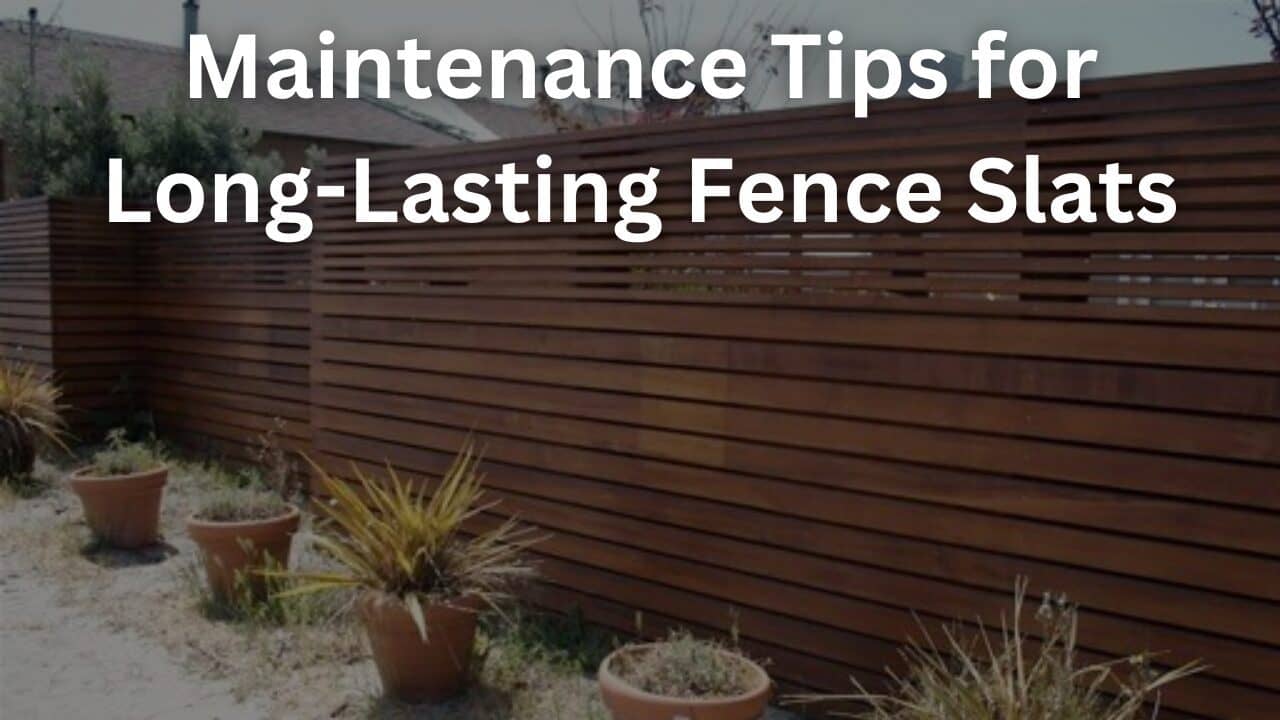Fences serve as a crucial component of our homes, providing privacy, security, and aesthetic appeal. However, the durability and longevity of your fence largely depend on how well you maintain it. Whether your fence slats are made of wood, vinyl, metal, or composite materials, consistent and proper maintenance can significantly extend their lifespan. In this comprehensive guide, we will explore various maintenance tips and practices that will help keep your fence slats in top condition for years to come.
Understanding Your Fence Material
Before diving into maintenance tips, it’s essential to understand the specific needs of your fence material. Different materials require different care strategies:
- Wood: Wooden fences are popular for their natural beauty and versatility. However, they are prone to rot, insect damage, and weathering if not properly maintained.
- Vinyl: Vinyl fences are low-maintenance and resistant to rot and insects, but they can become brittle in extreme temperatures and may require occasional cleaning.
- Metal: Metal fences, including aluminum and wrought iron, are durable and require minimal maintenance, but they can rust if not adequately protected.
- Composite: Composite fences are made from a combination of wood fibers and plastic, offering durability and low maintenance. They are resistant to rot and insects but can still benefit from occasional cleaning.
General Maintenance Tips for All Fence Types
Regardless of the material, some general maintenance practices can help prolong the life of your fence slats:
- Regular Inspections: Conduct periodic inspections of your fence to identify any signs of damage, wear, or potential issues. Look for cracks, warping, loose slats, rust, or mold growth.
- Cleaning: Keep your fence clean by removing dirt, debris, and mold. Use a garden hose, mild detergent, and a soft brush for cleaning. Avoid harsh chemicals that may damage the material.
- Repair Damage Promptly: Address any damage as soon as you notice it. Replace broken or loose slats, fix leaning posts, and treat areas affected by mold or rust.
- Vegetation Control: Trim plants and shrubs around your fence to prevent them from leaning on or growing through the slats. This helps reduce moisture retention and potential damage.
- Protect from Water: Ensure proper drainage around your fence to avoid water accumulation. Water can lead to rot in wooden fences and rust in metal fences.
Maintenance Tips for Wooden Fence Slats
Wooden fences require the most maintenance due to their susceptibility to weathering and pests. Here are some specific tips for maintaining wooden fence slats:
- Sealing and Staining: Apply a high-quality sealant or stain to your wooden fence every few years. This protects the wood from moisture, UV rays, and insects. Choose a product suitable for outdoor use and follow the manufacturer’s instructions.
- Painting: If your wooden fence is painted, inspect it regularly for peeling or chipping paint. Repaint as needed to maintain the protective layer. Sand the surface before applying a new coat of paint.
- Preventing Rot: Keep the bottom of your wooden fence slats elevated above the ground to prevent moisture from seeping in. Use gravel or concrete footings to support the posts.
- Insect Control: Regularly inspect your wooden fence for signs of insect infestation, such as termite tunnels or carpenter ants. Treat affected areas with appropriate insecticides or seek professional pest control services.
- Repairing Splits and Cracks: Fill small cracks and splits in the wood with exterior wood filler to prevent further damage. Sand the area smoothly and apply a sealant or paint.
Maintenance Tips for Vinyl Fence Slats
Vinyl fences are known for their low maintenance, but they still require some care to remain in excellent condition:
- Cleaning: Clean your vinyl fence periodically with a mixture of water and mild detergent. Use a soft brush or cloth to remove dirt and grime. For tough stains, a non-abrasive cleaner can be used.
- Avoid Harsh Chemicals: Do not use abrasive cleaners, bleach, or solvents on vinyl fences as they can damage the surface. Stick to gentle cleaning solutions.
- Preventing Cracks: Vinyl can become brittle in extreme cold. Avoid hitting the fence with heavy objects or using it as a support for heavy items, especially in cold weather.
- Inspecting for Damage: Regularly check for cracks, chips, or other damage. Promptly repair or replace damaged slats to prevent further issues.
- UV Protection: Some vinyl fences come with UV inhibitors to prevent fading. If your fence does not have this feature, consider applying a UV-resistant coating to maintain its appearance.
Maintenance Tips for Metal Fence Slats
Metal fences, including wrought iron and aluminum, are durable and can last for decades with proper care:
- Rust Prevention: Inspect your metal fence regularly for signs of rust. Remove rust spots with a wire brush and apply a rust-inhibiting primer and paint. Consider using a rust-resistant coating for added protection.
- Cleaning: Clean your metal fence with water and mild detergent to remove dirt and debris. For stubborn stains, use a soft brush or sponge. Avoid abrasive materials that can scratch the surface.
- Lubricating Hinges and Joints: If your metal fence has gates or movable parts, lubricate the hinges and joints periodically to ensure smooth operation and prevent rust.
- Protecting from Moisture: Ensure proper drainage around your metal fence to avoid water accumulation, which can lead to rust. Consider using a rust-resistant base or coating for added protection.
- Repairing Damage: Address any damage promptly, such as bent or broken slats. Use appropriate tools and materials for repairs to maintain the fence’s structural integrity.
Maintenance Tips for Composite Fence Slats
Composite fences are designed for low maintenance, but they still benefit from regular care:
- Cleaning: Clean your composite fence with water and mild detergent to remove dirt and grime. Use a soft brush or cloth to scrub the surface gently. Avoid using abrasive cleaners or tools.
- Preventing Mold and Mildew: Composite materials can develop mold and mildew in damp conditions. Clean affected areas with a solution of water and vinegar or a specialized composite deck cleaner.
- Avoiding Heavy Impacts: Composite fences are durable but can be damaged by heavy impacts. Avoid leaning heavy objects against the fence or using it as a support for climbing plants.
- Inspecting for Damage: Regularly check for cracks, chips, or other damage. Promptly repair or replace damaged slats to maintain the fence’s appearance and functionality.
- UV Protection: Some composite fences come with UV inhibitors to prevent fading. If your fence does not have this feature, consider applying a UV-resistant coating to maintain its appearance.
Seasonal Maintenance
Different seasons bring unique challenges for fence maintenance. Here’s a brief overview of seasonal maintenance tasks:
- Spring: Inspect your fence for winter damage. Clean the slats, trim vegetation, and apply any necessary treatments or repairs.
- Summer: Regularly clean the fence to remove dirt and mold. Check for insect infestations and treat affected areas. Reapply sealants or stains to wooden fences if needed.
- Fall: Clear fallen leaves and debris from around the fence. Inspect for damage from summer storms. Prepare your fence for winter by applying protective coatings and ensuring proper drainage.
- Winter: Remove snow buildup from your fence to prevent moisture damage. Inspect for ice damage and make any necessary repairs. Avoid using salt or de-icing chemicals near your fence, as they can cause damage.
Conclusion
Maintaining your fence slats is a crucial aspect of ensuring the longevity and functionality of your fence. By understanding the specific needs of your fence material and implementing regular maintenance practices, you can enjoy a beautiful, durable fence for many years. Remember to conduct regular inspections, clean your fence periodically, and address any damage promptly. Whether you have a wooden, vinyl, metal, or composite fence, these maintenance tips will help you keep your fence in excellent condition and protect your investment.




